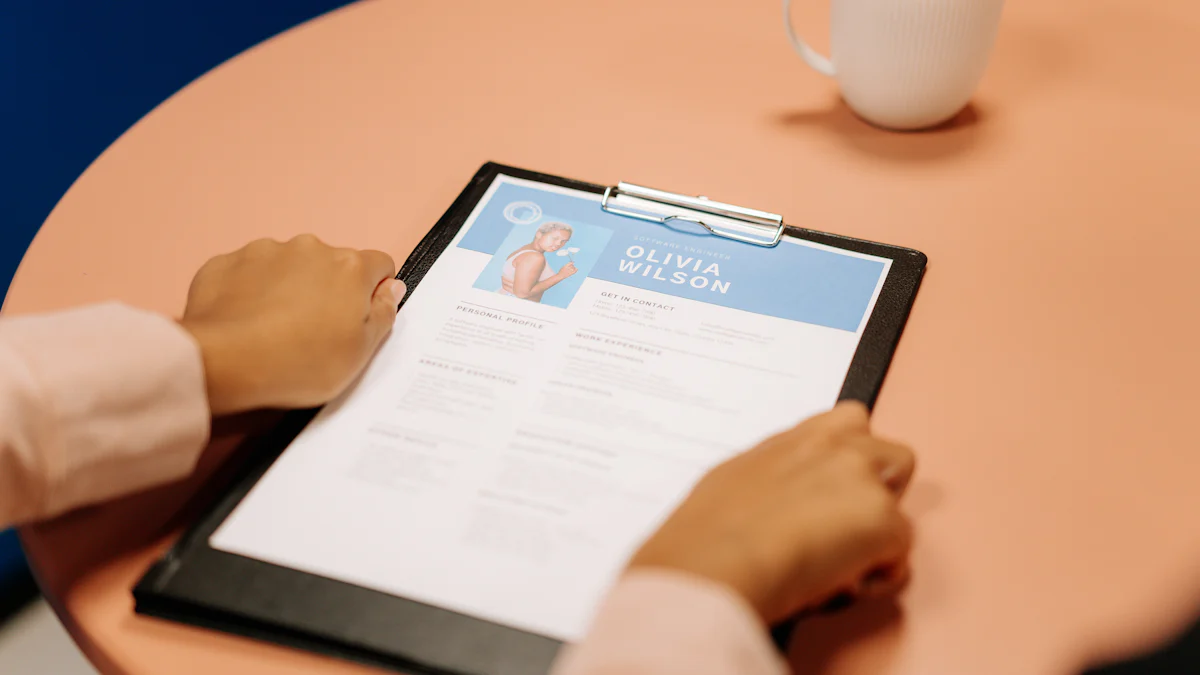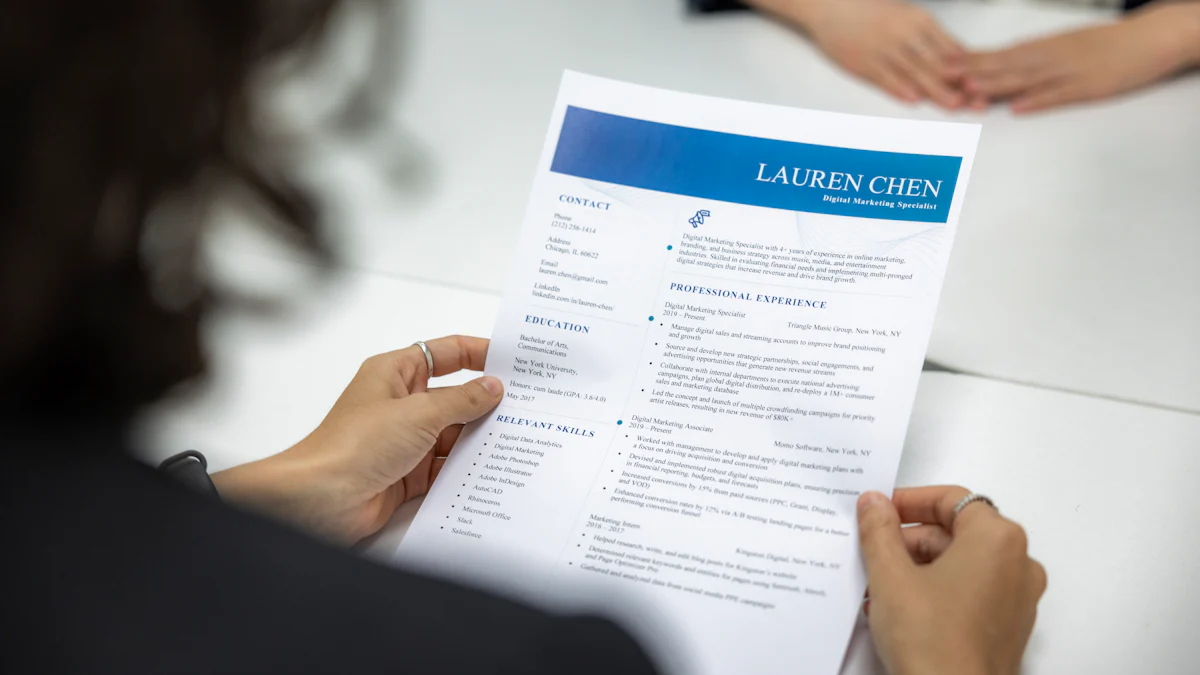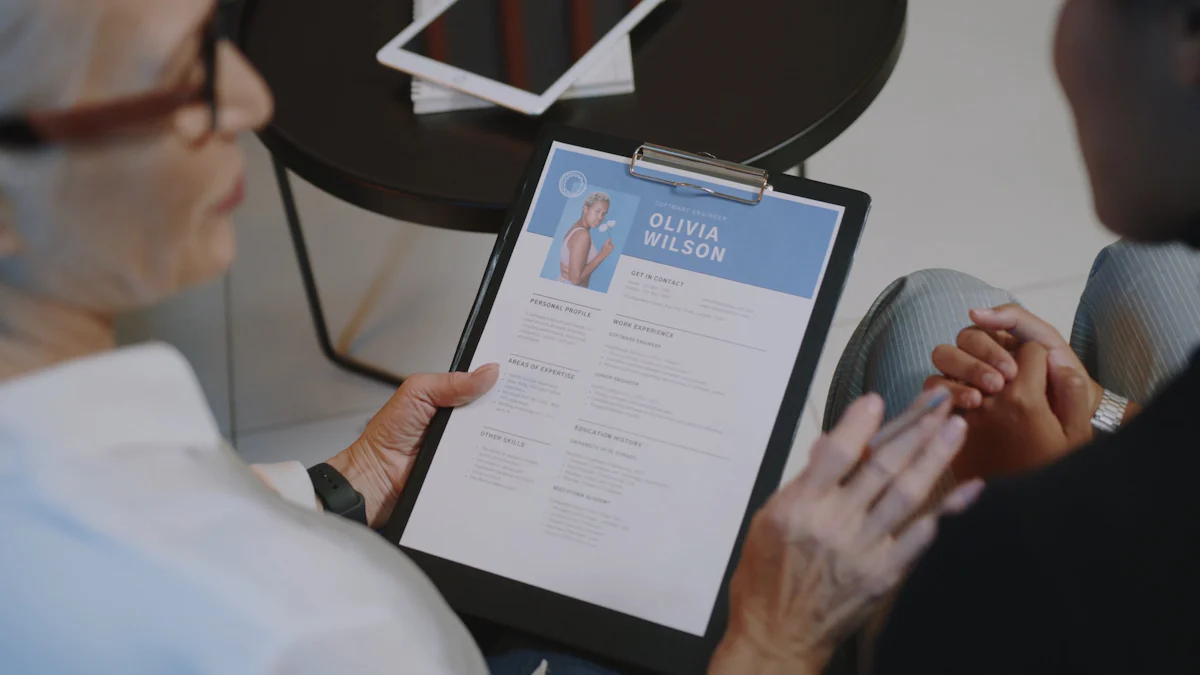How to Effectively Showcase Research Experience on Your Resume
Try Aihirely for
Smarter Interview Prep
Experience real-time AI support tailored to your Resume.
Boost your confidence and ace every question with
AI Mock Interview.

Image Source: pexels
Your research experience can be a game-changer for your resume. It shows employers that you’re curious, detail-oriented, and capable of solving problems. Whether you’ve worked on academic projects or tackled industry challenges, showcasing this experience effectively can make you stand out. But here’s the catch—tailoring your research to match the job you’re applying for is key. You might even wonder, “should I put my research on my resume?” The answer depends on how relevant it is to the role. When done right, your research can highlight your unique strengths and open doors to exciting opportunities.
Key Takeaways
-
Show your research experience to prove problem-solving and focus skills.
-
Change your research details to fit the job you want.
-
Use strong action words and numbers to highlight your work.
-
Place your research in the best section of your resume.
-
Update your resume often to match new research and job needs.
Why Research Experience Matters
Research experience isn’t just for scientists or academics. It’s a powerful asset that can boost your resume, no matter your career path. Let’s explore why it matters and how it can make you stand out.
The Value of Research Across Careers
Academic and Research-Oriented Roles
If you’re aiming for a career in academia or research, your research experience is your golden ticket. It shows your ability to design experiments, analyze data, and contribute to knowledge in your field. For example, a psychology master’s student who led data analysis in a cognitive therapy study demonstrates expertise that directly aligns with academic roles.
Industry and Corporate Roles
Research isn’t limited to labs or universities. In the corporate world, it’s a game-changer. A junior-level data engineer who developed an ETL pipeline or a financial analyst who identified cost-saving opportunities through research showcases how research drives results. Employers value these skills because they lead to innovation and efficiency.
Transferable Skills for Any Career
Even if your job doesn’t involve direct research, the skills you’ve gained—critical thinking, problem-solving, and attention to detail—are universal. For instance, a product manager who spearheaded research-driven product development highlights their ability to use data for decision-making. These skills are valuable in any role.
| Career Role | Research Experience Description |
|---|---|
| Undergraduate student | Collaborated on a study examining the effects of light on photosynthesis, revealing blue light’s heightened influence on plant growth. |
| Junior-level data engineer | Developed an ETL pipeline for real-time data integration, significantly reducing data latency. |
| Financial analyst | Analyzed company financials to identify potential savings, showcasing the importance of research in financial decision-making. |
| Product manager | Spearheaded research-centric product developments, leading to increased user retention through data analytics. |
Should I Put My Research on My Resume?
You might wonder, “should I put my research on my resume?” The answer depends on the job and how relevant your research is. Here’s how to decide:
When Research is Relevant to the Job
If your research aligns with the job description, include it. For example, if you’re applying for a data analyst role and your research involved statistical modeling, it’s a perfect match. Highlight the methods and tools you used to show your expertise.
Highlighting Research for Career Changers
Switching careers? Tailor your research experience to fit the new role. Focus on transferable skills like data analysis or project management. Use action verbs and quantify your achievements to make your experience stand out.
Including Research for Entry-Level Roles
For entry-level roles, research experience can fill the gap if you lack work experience. Whether it’s an academic project or an internship, it shows you’ve developed valuable skills. Be sure to connect your research to the job requirements.
Tip: Always prioritize relevance. Include the most impactful research projects and align them with the job you’re applying for.
How to Structure Research Experience

Image Source: unsplash
Structuring your research experience on a resume can make all the difference in how it’s perceived. Let’s break down the best ways to organize and present it for maximum impact.
Best Placement for Research on Your Resume
Where you place your research experience depends on its relevance to the job. Here are some options:
Dedicated Research Section
If research is a major part of your background, give it its own section. This works well for academic or research-heavy roles. Label it “Research Experience” and list your projects with clear descriptions.
Work Experience Section
For industry roles, include research under your work experience. Show how your research contributed to business outcomes. For example, if you improved a process by 20%, highlight that.
Education Section
If your research was part of your degree, list it under education. Mention the project title, your role, and key achievements. This is especially useful for students or recent graduates.
Projects or Skills Section
For less formal research, like independent studies or side projects, use a “Projects” or “Skills” section. Focus on the skills you gained, such as data analysis or problem-solving.
Organizing Research for Maximum Impact
How you organize your research can influence how it’s received. Use these tips to make it shine:
Chronological vs. Relevance-Based Order
You can list research chronologically or by relevance. For jobs closely tied to your research, prioritize relevance. For example, if you’re applying for a data analyst role, list research involving statistical modeling first.
Grouping Similar Research Projects
If you’ve worked on multiple related projects, group them together. For instance, combine all projects involving machine learning under one heading. This keeps your resume clean and focused.
Tip: Always describe your role, methods, and outcomes. Even if you lack publications, focus on what you contributed and learned.
Formatting Research Experience
Good formatting ensures your research stands out. Here’s how to make it visually appealing:
Using Bullet Points for Clarity
Break down your research into bullet points. Start each point with an action verb, like “Designed,” “Analyzed,” or “Developed.” This makes your contributions easy to scan.
Maintaining Consistent Design
Keep your resume design consistent. Use common fonts like Arial or Times New Roman, and stick to sizes between 10.5 and 12-point. Add white space between sections for readability. Highlight key achievements with bold text, and include numbers or percentages to emphasize results.
| Technique | Description |
|---|---|
| Create white-space | Ensure sufficient white space around the document and between lines of text for better readability. |
| Use common fonts and sizing | Stick to fonts like Arial or Times New Roman, with sizes between 10.5 to 12-point for text. |
| Use clear section headings | Make section headings definitive and visually distinct to guide the reader through the resume. |
| Use bullet points | Break up content with bullet points for easier scanning and comprehension. |
| Highlight important information | Use bold text to draw attention to key achievements or skills. |
| Utilize quantitative information | Incorporate numbers and percentages to emphasize accomplishments effectively. |
Pro Tip: Quantify your research whenever possible. For example, mention the number of experiments conducted or the percentage of improvement achieved.
How to Describe Research Experience
Describing your research experience effectively can make your resume shine. It’s all about using the right words, quantifying your achievements, and tailoring your descriptions to the job you want. Let’s break it down step by step.
Writing Strong Descriptions
Using Action Verbs Effectively
Action verbs bring your research to life. They show what you did and how you contributed. Instead of saying, “Responsible for data collection,” try something like, “Collected and analyzed data from 300+ samples.” Here are some powerful action verbs you can use:
-
Analyzed
-
Designed
-
Investigated
-
Summarized
-
Evaluated
-
Organized
-
Researched
-
Verified
These words make your experience sound active and impactful. They also help recruiters quickly understand your role in the project.
Avoiding Passive Language
Passive language can make your achievements sound less impressive. For example, “The data was analyzed by me” feels weak compared to “I analyzed the data.” Always write in an active voice. It keeps your descriptions clear and engaging.
Quantifying Research Achievements
Adding Metrics and Results
Numbers make your accomplishments tangible. They show the scale and impact of your work. For instance, instead of saying, “Improved efficiency,” you could say, “Boosted efficiency by 15% through optimized workflows.”
Examples of Quantified Statements
Here are some examples to inspire you:
| Example Description | Quantified Outcome |
|---|---|
| Surveyed 500+ meals over six months | Revealed a 58% decline in protein-rich food choices |
| Developed an ETL pipeline processing 2TB+ daily | Reduced data latency by 80% |
| Led data analysis of 100+ patient evaluations | Resulted in a 20% improvement in therapeutic outcomes |
Adding metrics like these makes your research more compelling.
Tailoring Research to Job Descriptions
Aligning with Job Keywords
When applying for a job, match your research experience to the job description. If the role mentions “data analysis” or “statistical modeling,” highlight those skills in your resume. Use the same keywords to show you’re a perfect fit.
Highlighting Relevant Contributions
Focus on the parts of your research that align with the job. For example, if you’re transitioning to a product management role, emphasize how your research involved collaboration, problem-solving, or decision-making. This approach is especially useful if you’re asking yourself, “should i put my research on my resume?” The answer is yes—if it’s relevant and impactful.
Pro Tip: Tailor your resume for each job. Highlight the skills and achievements that matter most for the role.
Examples of Research Experience

Image Source: pexels
Your research experience can shine on your resume when presented with the right examples. Whether you’re just starting out, have years of experience, or are switching careers, here’s how to showcase your research effectively.
Entry-Level Research Examples
Academic Research Projects
If you’re a student or recent graduate, academic projects can highlight your skills. These projects show your ability to analyze, collaborate, and solve problems. Here’s a table with examples you can include:
| Project Title | Description | Role |
|---|---|---|
| Effects of Light on Photosynthesis | Collaborated on a study examining 40+ seedlings, revealing blue light’s influence on growth. | Undergraduate student |
| Dietary Habits of University Students | Surveyed 500+ meals over six months, revealing a 58% decline in protein-rich food choices. | Recent college graduate |
| Efficiency of Modern Water Purification | Analyzed 300+ water samples, achieving a 90% reduction in contaminants. | Master’s student in Psychology |
These examples demonstrate your ability to conduct research and deliver results.
Internships with Research Components
Internships often involve valuable research experience. Highlight measurable outcomes and use action-oriented language to describe your contributions. For example:
-
Conducted data analysis on 100+ patient evaluations, improving therapeutic outcomes by 20%.
-
Designed an ETL pipeline processing 2TB+ of data daily, reducing latency by 80%.
-
Captured insights from 250+ employee responses, leading to a 10% boost in satisfaction scores.
Focus on the skills you developed, like data analysis or problem-solving, and tailor your descriptions to the job.
Mid-Level and Experienced Professionals
Industry Research Contributions
For mid-level professionals, emphasize how your research impacted business outcomes. For instance:
-
Improved a company’s financial health by identifying $1.2M in savings through detailed audits.
-
Spearheaded research-driven product development, increasing user retention by 15%.
-
Optimized workflows, boosting operational efficiency by 20%.
These examples show how research can drive tangible results in the workplace.
Published Papers or Patents
If you’ve published papers or hold patents, include them to demonstrate expertise. Mention the title, publication, and your role. For example:
-
Co-authored “Advances in Machine Learning,” published in Journal of Data Science.
-
Developed a patented water purification method, reducing contaminants by 90%.
These achievements highlight your ability to innovate and contribute to your field.
Career Changers
Framing Research in a New Context
Switching careers? Frame your research to match the new role. Highlight transferable skills like project management, data analysis, or collaboration. Use the summary section of your resume to connect your research to the job. For example:
-
Managed a team of researchers, showcasing leadership skills.
-
Conducted statistical modeling, aligning with data-driven roles.
Emphasizing Transferable Skills
Focus on skills that apply across industries. For instance:
-
Problem-solving: Designed experiments to test hypotheses.
-
Communication: Presented findings to diverse audiences.
-
Organization: Managed multiple projects with tight deadlines.
Awards, internships, or externships can also demonstrate the impact of your research. Use these to show how your experience adds value to your new career path.
Tip: Always tailor your examples to the job you’re applying for. Highlight the skills and achievements that matter most to the role.
Tips and Common Mistakes
Practical Tips for Success
Keep Descriptions Concise
When describing your research experience, less is more. Recruiters often skim resumes, so you want your key points to stand out. Use bullet points to break down your contributions and focus on the highlights. For example, instead of writing a long paragraph about your role in a project, summarize it in one or two impactful sentences. Stick to the essentials—what you did, how you did it, and the results.
Tip: Avoid overloading your resume with every detail. Prioritize the most relevant and impressive aspects of your research.
Use Professional Language
Your resume should sound polished and professional. Avoid casual phrases or slang. Instead, use action verbs like “analyzed,” “developed,” or “optimized” to describe your work. These words make your experience sound dynamic and impactful. Also, mirror the language used in the job description. If the role emphasizes “data analysis” or “problem-solving,” use those terms to show you’re a great fit.
Pro Tip: A professional template can enhance readability and make your resume look clean and organized.
Mistakes to Avoid
Overloading with Technical Jargon
While it’s tempting to showcase your expertise, too much technical jargon can confuse recruiters. Remember, not everyone reviewing your resume will have a deep understanding of your field. Simplify complex terms and focus on the results of your work. For instance, instead of saying, “Utilized CRISPR-Cas9 for gene editing,” you could say, “Applied advanced gene-editing techniques to improve crop resilience.”
Failing to Quantify Achievements
Numbers speak louder than words. If you don’t quantify your achievements, your impact might get overlooked. For example, instead of saying, “Improved efficiency,” say, “Boosted efficiency by 20% through optimized workflows.” Metrics make your contributions tangible and memorable.
Neglecting Relevance to the Job
One of the biggest mistakes is including research that doesn’t align with the job you’re applying for. Tailor your resume to each role by highlighting the most relevant projects and skills. Review the job description carefully and mirror its language to show you’re a perfect match. Don’t forget to include atypical experiences, like volunteer work or personal projects, if they demonstrate transferable skills.
Note: Always consider all your research skills, not just one. A well-rounded resume can make you stand out.
Your research experience can be a powerful tool to elevate your resume. When you structure it thoughtfully and tailor it to the job, you show employers exactly why you’re the right fit. Highlighting your contributions—whether it’s improving efficiency, solving problems, or driving innovation—makes your resume stand out.
Here’s a quick recap of impactful research contributions you might include:
| Role | Research Contribution | Impact |
|---|---|---|
| Undergraduate student | Effects of Light on Photosynthesis study | Revealed blue light’s influence on growth |
| Financial analyst | Company Health Audit study | Identified $1.2M in potential savings |
| Senior machine learning engineer | Image recognition research | Boosted model accuracy by 15% |
Updating your resume regularly ensures you’re always ready for opportunities. It saves time, reduces stress, and keeps your details accurate. Plus, it highlights your critical thinking, problem-solving, and technical skills.
Tip: Dedicate a section for research, integrate it into relevant roles, or showcase publications. Tailor every detail to match the job description.
Take the time to refine your resume. Your research experience deserves to shine!
FAQ
How do I know if my research experience is relevant to a job?
Look at the job description. Does it mention skills or tools you used in your research? If yes, include it. For example, if the role requires data analysis and you’ve done that in your research, it’s relevant.
Tip: Match your research to the job’s keywords for better alignment.
Should I include unpublished research on my resume?
Yes, if it’s relevant! Unpublished research still shows your skills and experience. Focus on what you did, like data collection or analysis, and the results you achieved. Employers care about your contributions, not just publications.
Can I list group research projects on my resume?
Absolutely! Just highlight your role in the project. Did you lead the team, analyze data, or write the report? Be specific about your contributions to show your value.
Pro Tip: Use action verbs like “led,” “designed,” or “collaborated” to describe your role.
How do I showcase research if I’m switching careers?
Focus on transferable skills. Highlight problem-solving, data analysis, or project management. Tailor your descriptions to fit the new role. For example, emphasize teamwork or communication if the job values collaboration.
Should I include research experience if I have limited work experience?
Yes! Research can fill gaps in your resume. It shows you’ve developed valuable skills like critical thinking and attention to detail. Connect your research to the job requirements to make it stand out.
Note: Even academic projects or internships count as experience.
